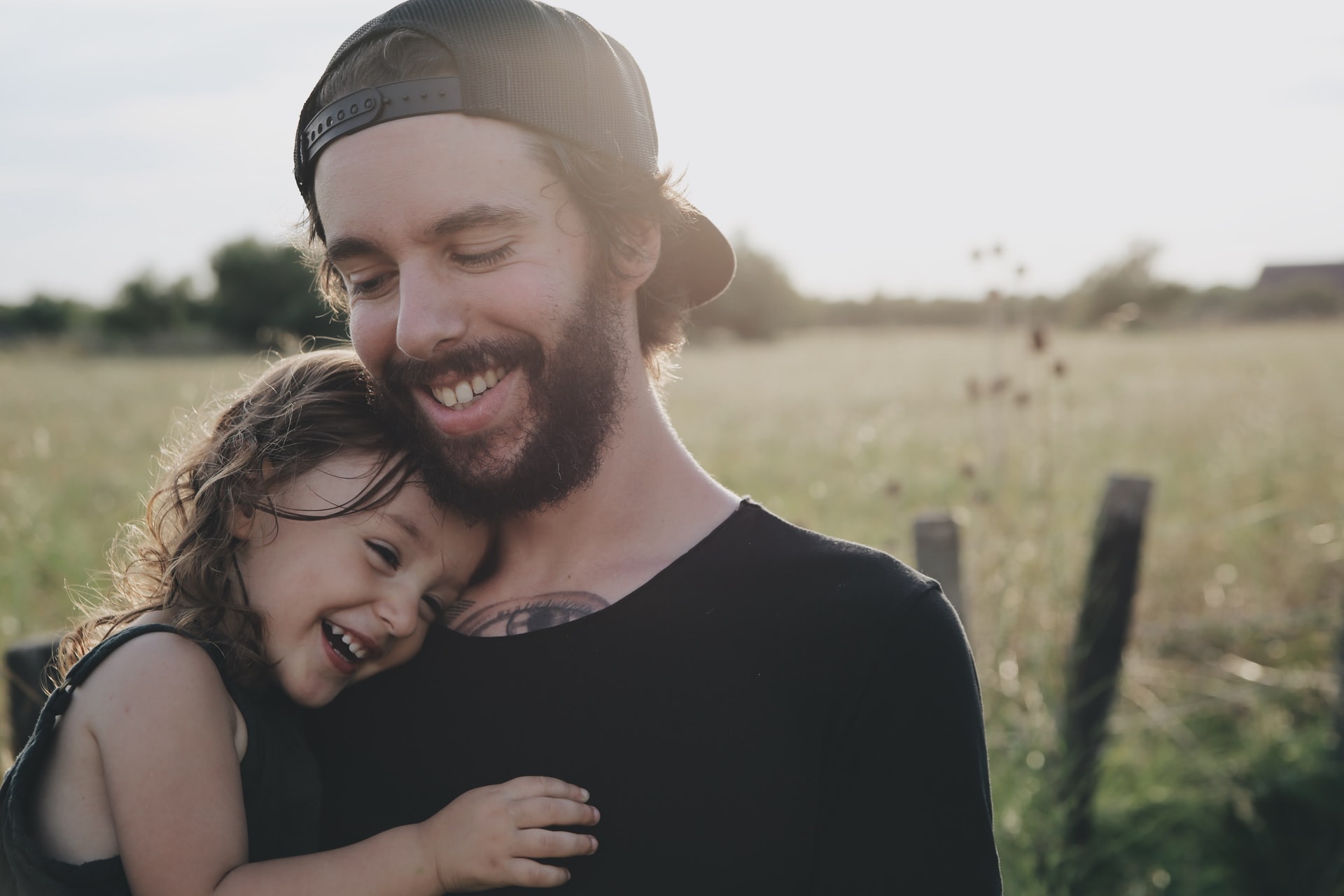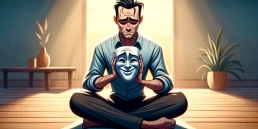A Dose of Hope: How I beat depression without medication
Note: I am not a doctor and this is not medical advice. If you are experiencing serious symptoms, please consult a professional.
Looking back, there were many signs that things weren’t right.
There was the lack of energy. No matter how much I slept, I was always tired.
I struggled to be intimate with my girlfriend and my libido had hit rock bottom.
I was irritable and moody, quick to argue and impossible to reason with.
I was eating to try and make myself feel good and putting on weight.
At times, it felt like my skull was about to cave in and there was no life behind my eyes.
But the thing that really made me stop and take notice was the fact that I had stopped smiling.
In fact, I couldn’t smile.
The thing is, before this phase of my life, I was always smiling.
Smiling was my default resting face.
Something was seriously wrong with me.
The ‘D’ word: Grappling with depression
It’s probably fair to say that everyone knows someone who has – or has had – depression.
You might have experienced depression yourself. You might be experiencing it right now (please reach out if you need to).
I’m not saying that I was clinically depressed because I don’t think I was and, besides, I never consulted a doctor.
But I did have many of the common symptoms of what’s described as “major depression”.
I’m hesitant to even use the ‘d’ word because it gets thrown around a lot and everyone experiences dark days.
I don’t want to pretend that I know what the depths of depression feels like (I don’t), and I really don’t want to minimise the experiences of people who live with depression every day.
However, I have dipped my head below the surface a few times and managed to pull myself back out – without having to see a doctor or use prescription medicine.
And, I think, what I’ve learned will be helpful for some people.
The information in this article is based on extensive research, but mostly my personal experiences.
But your experiences won’t necessarily be the same as mine, so feel free to take what you find useful and discard the rest.
Due to the unpredictable nature of the human mind, results will vary.
You may need medication to help overcome depression, but it can’t hurt to experiment with lifestyle changes, too.
Whether these steps help you to make a full recovery or not, they will undoubtedly help to improve your mental wellbeing and overall quality of life – sometimes within seconds.
How to overcome depression without prescription drugs
You can treat this list as a smorgasbord that you can pick and choose from.
Some of my suggestions might work for you, others might not.
Some might sound a little too ‘out there’, while others might be just weird enough to try.
They are all things that have helped me and I hope they help you, too.
1. Admit that something’s wrong
I never thought I’d be one to get depressed. I was positive and happy.
I tried to live a healthy, balanced, wholesome life.
At first, I didn’t even consider the possibility that I could be depressed.
But after a few weeks of living like a zombie, I realised that I needed to change.
That was the first step to regaining control.
I had to be honest with myself and accept that something was out of balance.
2. Let someone in
The next step is letting someone in. For me, that’s usually my girlfriend.
This is harder than it sounds because, when I feel depressed, my natural tendency is to shut myself off from other people.
My girlfriend calls it “going into my turtle shell”. And that’s typically what I do for at least the first few hours (sometimes days). I hide away in my turtle shell feeling sorry for myself.
But eventually I find the courage to either pop my head out and tell my girlfriend what’s going on, or I invite her in for a cuddle and chat.
Do you know what happens then?
Walls break down.
There’s something about the act of sharing that cracks me open and lightens my load.
A burden shared is a burden halved.
I’m not sure if it’s halved perfectly down the middle (it doesn’t feel like it), but the burden always feels lighter.
3. I am not depressed
Words are important.
Please don’t say the words “I am depressed”.
You feel depressed or you’re experiencing depression, at the moment.
Don’t attach your identity to your mental state.
You might not believe in this stuff, but I think the words we use – and the stories we tell ourselves – are more important than we realise.
Therefore, I am not depressed.
I’m just feeling a bit shit.
Want to get advice like this in your inbox?
Sign up for the newsletter here.
4. Start with supplements
The mind and body are interconnected.
It’s no surprise that my depressive states are always accompanied by low energy levels and a non-existent sex drive.
It’s my body’s way of saying “hey, there’s something not quite right here”.
Depression is largely the result of a chemical imbalance in the body.
Antidepressants are designed to correct that imbalance, but I try to avoid pharmaceutical medications as much as possible.
Normally I also try and steer clear of supplements in preference of letting thy food be thy medicine.
That’s why I start by looking at common nutritional and biological reasons for feeling depressed.
But sometimes we can’t get everything we need from our diet fast enough.
That’s where nutritional supplements come in.
I always start feeling better within two to three days of taking the right supplements.
They help with overall mood, energy, stress, and libido.
Iron
The first time I ever felt this way I had been on a vegetarian diet for six months.
It’s common for vegetarians and vegans to be deficient in iron. In fact, iron is said to be the most common nutrient deficiency in the world, full stop.
The more I read about iron, the more I thought it could be contributing to my state of depression.
Iron deficiency is a common cause of low energy and it’s also been linked to low libido. Tick, tick.
So the next day I went to my local supermarket and grabbed a bottle of iron pills. I read that it’s best to take iron with vitamin C as it helps with absorption.
Call it placebo if you want to, but I felt an improvement in my mood and energy the very next day.
Now whenever I start feeling depressed, I always reintroduce an iron supplement.
I don’t have a favourite brand, but I recommend using one that contains natural ingredients and is derived from whole foods.
B12
Vitamin B12 can also help improve mood, energy, symptoms of depression and sex drive.
Studies have found links between B12 supplementation and recovery from major depression.
I started taking B complex supplements, which include B12, during my first bout of depression and found them to be helpful.
Now I take a B12 supplement regularly and up the frequency when I feel like retreating into my turtle shell.
It doesn’t matter how you get your B12. I’ve taken it in pill and liquid form.
I highly recommend supplementing with B12 if you feel yourself slipping into a depressive state.
D3
One of my worst bouts of depression came after I moved from late winter in New Zealand to early Autumn in Germany (effectively back-to-back winters).
The winter in Germany is brutal. The sun comes up around 7am, the weather is overcast all day, and it’s dark by around 4.30pm.
I’d never experienced this before and the lack of sunlight really took its toll on me.
The sun is a powerful source of vitamin D.
If you’re not getting sunlight on your body, you’re probably deficient in vitamin D.
Studies have found a “significant relationship between depression and vitamin D deficiency”.
“Effective detection and treatment of inadequate vitamin D levels in persons with depression and other mental disorders may be an easy and cost-effective therapy which could improve patients’ long-term health outcomes as well as their quality of life.” – Study
I started taking vitamin D supplements during the German winter and it helped me a lot.
I recommend getting a D3 supplement that contains K2 as they’re meant to act more effectively together.
I didn’t just take supplements though. I took every opportunity I could to get natural sunlight on my skin.
As a result, I’ve developed a new level of appreciation for the sun.
I wouldn’t be surprised if most people in a depressive slump have vitamin deficiencies.
The modern diet and lifestyle is designed to keep us from getting all the nutrients we need.
You can go ahead and get a proper blood test to check your levels of vitamins and minerals, or you could try supplementing with the ones I’ve mentioned.
I wouldn’t be surprised if you notice a difference within a day or two.
5. Move your body
Our bodies are made to move.
Moving makes us feel good – physically and mentally.
I always feel better after working out, going for a run, or even a bike ride to the local supermarket and back.
Research has found that even low-intensity exercise, like walking and gardening, can help to treat and prevent depression.
If I’m feeling down, I always try and prioritise physical exercise.
The thing is, when I’m feeling depressed I just want to lay on the couch and binge watch YouTube.
I’ve had to learn to overcome this tendency.
Joe Rogan calls it “conquering your inner bitch”.
That might sound a bit harsh to you, but it works for me.
You don’t even have to think of it as working out, just think of it as medicine for your brain. Whatever it takes to get moving.
Bioenergetics / Dynamic meditation
I have started exploring other ways of moving my body, such as bioenergetics and dynamic meditation.
I was turned on to bioenergetics by Elliott Hulse who, I think, adopted it from Osho’s teachings.
Bioenergetics simply refers to the energy flow in living systems.
But in this context, it’s about channelling energy through uninhibited movement.
It’s typically used to unblock and release emotions. You know, the ones we bottle up inside that surface as depression.
You can go all-in and jump around screaming. The screaming can be cathartic in and of itself.
However, because I live in an apartment and I don’t want my neighbours to call the police, I just jump around and shake my body, occasionally making caveman-like grunting noises.
You might feel ridiculous but I’ve genuinely found it to help with feelings of depression. It’s like I’m shaking away negative emotions, generating positive energy, and making space for the real me to return.
There’s something about letting go of control that I find incredibly liberating – and it only takes a couple of minutes to completely change your physiological state.
Don’t knock it till you try it.
Ecstatic dance
Dance is another way of moving the body that can help with processing emotions.
Ecstatic dance is similar to bioenergetics in that you simply abandon yourself to the rhythm of the music.
I don’t do this often, but occasionally when I’m feeling blue I’ll put on my ecstatic dance playlist of tribal music on Spotify and dance around the lounge.
It’s incredibly effective for relieving stress and it also helps me to tap into my primitive side.
When it comes to movement, there’s no one-size-fits-all.
Everything from a short walk around the block to screaming and jumping around like a lunatic will be beneficial when you’re feeling depressed.
Do what works for you.
6. Practice mindfulness
Mindfulness meditation is another practice I use to help manage depressive episodes.
I would consider it more of a preventative measure than a treatment.
The science on meditation and depression is flimsy. But it’s been shown to help with stress and anxiety, which are strongly linked to depression.
Meditation helps me not to identify with my thoughts and to see emotions, including depression, as transitory experiences.
At its core, meditation is simply noticing your thoughts and feeling. When you practice this enough, you start to see how your thoughts and feelings are constantly trying to take over the steering wheel of your life and you develop the ability to quickly take back control.
I highly recommend adopting a regular mindfulness practice.
At the very least, it provides time and space to just be with yourself and your thoughts, away from distraction for just a few minutes a day.
At best, it could be a powerful preventative measure that helps you to cope better with stress, anxiety and depression.
If you’re turned off by the “woo woo” spirituality around meditation, you should know that it can be an entirely secular practice.
7. Go outside
Nature is a powerful healer. I wrote a whole post about this.
I feel my best when I’m in the mountains, away from the commotion of the modern world.
But when I can’t be in the mountains, I at least try and go outside.
I live near the ocean so I can go for a cold dip or a walk along the coast.
My girlfriend and I try and go for a forest walk once a week or so.
I need time in nature to feel fully alive.
Studies have found that spending just 30 minutes in a forest once a week can help to relieve stress, anxiety and symptoms of depression.
Simply looking at a photo of nature on a computer screen can help to reduce stress levels.
I’ve lost count of the times that nature has helped to pull me out of a depressive slump and reawaken a childlike wonder and appreciation for life.
If there was one thing I’d recommend for depression above everything else, it would be nature therapy.
8. Breathe
Deep breathing has been shown to help relieve stress and anxiety, which are common precursors to – and symptoms of – depression.
I wrote a post about the best breathing exercise for stress and anxiety here.
Six deep belly breaths is all it takes to drastically alter you mental and physiological state.
You could also experiment with box breathing or Dr Andrew Wiel’s 4-7-8 technique.
I use controlled deep breathing during meditation to help with stress. Occasionally I’ll do rapid breathing, also known as Breath of Fire, to flood my body with oxygen and provide an energy boost (similar to this technique).
If you need a free tool to help you in just a minute or two, controlled breathing is incredibly efficient and effective.
It tells our nervous system that our environment is safe and we don’t need to be in fight or flight mode (stress and anxiety).
Depression can be much easier to deal with when we’re not in a highly stressed state.
So, as Wim Hof says: Breathe, motherfucker.
9. Eat clean
When I feel depressed, I crave sugar, salt and fat.
It’s because those substances light up the pleasure centre in our brain and make us feel good… temporarily.
But we all know how sugary, salty, fatty foods aren’t so good for our physical and mental wellbeing.
I’m not saying go sugar free, low fat, keto, paleo, vegan or anything like that.
But I find that being more mindful of what I eat helps a lot with my mood.
Science is revealing how our microbiome (in our stomach) plays an important part in regulating mental balance.
The microbiome is commonly referred to as our “second brain” and it’s where most of our serotonin (happy hormone) is produced.
The so-called good bacteria in microbiome thrive with a diverse array of fresh whole foods, while the bad ones love sugar and processed foods.
I know I don’t need to convince you that diet and mental wellbeing are linked.
The easiest way to think about this is to try and “eat the rainbow”, meaning have an assortment of colours on your plate for most meals.
10. Do what brings you joy
This one might seem a bit obvious.
But there’s something weird that happens when I feel depressed.
And it’s this… I don’t feel like doing the things that I know will make me happy.
I think it’s because I kind of enjoy feeling sorry for myself and wallowing in self-pity. Do you know that I mean?
I kind of like feeling like crap and hating the world because when I’m in that space I have a reason to blame things other than myself.
It’s classic self-sabotage.
So… to get over that… Do the things you love to do.
For me, that’s playing guitar, getting into nature, watching a comedy special on Netflix, or a UFC event.
It’s spending quality time with my girlfriend.
Maybe it’s catching up with my family on Skype.
I typically find that I forget about feeling depressed after doing things that I enjoy.
It doesn’t have to be anything drastic.
Joy can be found in the simple things.
11. Cold exposure
I challenge you to submerge yourself in ice cold water while still thinking about feeling depressed.
It’s impossible.
The cold shocks you into the present moment. It sucks the air out of you. It awakens your senses.
And… it kind of signals to your brain that you’re at risk of dying if you don’t get out soon. So your depression takes a back seat.
I’ve been taking regular cold plunges and cold showers for about two years.
Cold therapy or ice baths have been found to help improve mood, aid physical recovery, and support the immune system.
The main reason I do it is to help my mood. But because the cold acts as a stressor on the body and mind, it also builds mental resilience.
The scientific links between cold water and depression are yet to be fully established, but it’s been hypothesised that “cold hydrotherapy can relieve depressive symptoms rather effectively”.
“The following evidence appears to support the hypothesis: Exposure to cold is known to activate the sympathetic nervous system and increase the blood level of beta-endorphin and noradrenaline and to increase synaptic release of noradrenaline in the brain as well. Additionally, due to the high density of cold receptors in the skin, a cold shower is expected to send an overwhelming amount of electrical impulses from peripheral nerve endings to the brain, which could result in an anti-depressive effect.”
I swear by the therapeutic benefits of cold showers and cold dips in the ocean, lakes, or mountain streams.
You can start with just a minute of cold water at the end of a hot shower and slowly increase your cold exposure time.
12. Be thankful
Tony Robbins says that fear and gratitude can’t coexist.
I would say the same goes for depression.
You can’t be genuinely thankful and depressed at the same time.
Even if your situation is truly dire, there’s always something to be thankful for.
Do you have reasonable health? Do you have a functioning mind? A roof over your head? Clothes on your back? Food in the fridge? Someone who cares about you? An education? Enough money to get by on? A device to read this article on?
If you can answer yes to one of those questions, you have more going for you than a lot of people.
Be thankful for those things.
Say it out loud if you have to.
At the dinner table, my girlfriend and I sometimes ask each other, “What was the highlight of your day?”
It forces us to choose something to be thankful for.
Even if gratitude doesn’t cure your depression, it will help to create a moment in which it fades into the background.
Take responsibility for your wellbeing
If there’s one thing that I hope you get from this article it’s that there are many tools and techniques that you can use to overcome feelings of depression.
Most of them don’t cost anything and only take a few minutes to do.
We need to understand that we aren’t slaves to thoughts, feelings, and chemical imbalances in our body. We have the ability to influence how we feel by the way we live our lives.
If you are going through a particularly dark time, please feel free to reach out for a chat. Or, even better, contact a friend, helpline, or doctor that you know and trust to talk about it.
The society that we’ve built and our modern lifestyles wreak havoc on our mental wellbeing and there’s absolutely no shame in admitting that you’re struggling.
You’re not alone. There is hope.

 By
By 

